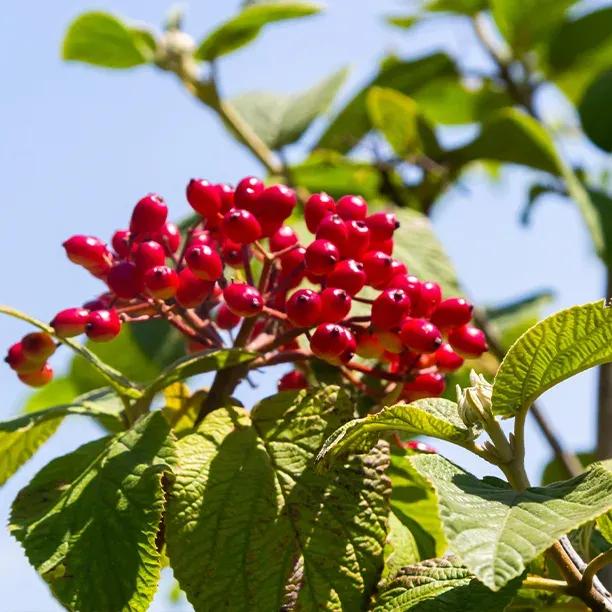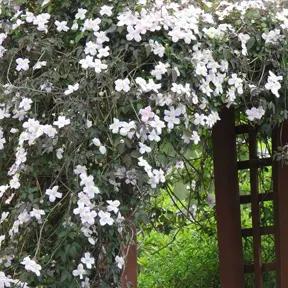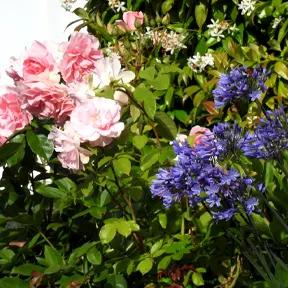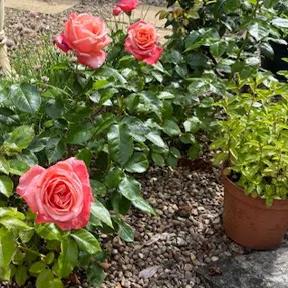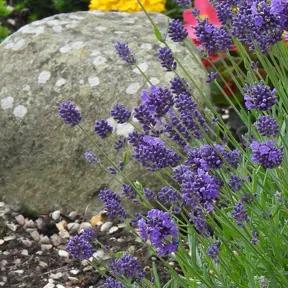Wayfaring Tree Hedge Plants
Viburnum lantana
Hedge Plants- Good native hedging. Crimson autumn leaves.
- Grows on chalk.
- Max. Height: 5m
- RHS Plants for Pollinators
- Bareroot Delivery Only: Nov-Mar.
Recommended extras
Description
Viburnum lantana Hedging
Delivered by Mail Order Direct from our Nursery with a Year Guarantee
The Wayfaring Tree, Viburnum lantana, is a large native shrub or small, bushy tree that is great for mixed country hedges. It will grow on any soil or situation apart from waterlogged sites and inner-city roadside.
Wayfaring Tree is good for hedges up to about 5 metres high and will reach the same height if it grows freely as a tree.
It is a natural companion to Viburnum opulus in a mixed hedge, and we grow two more ornamental varieties that can also make good hedges, Viburnum bodnantense Dawn and the evergreen Viburnum tinus Eve Price. Browse our selection of native hedging plants or view our full range of hedging.
Bareroot hedge plants are only delivered during winter (Nov-March).
Choosing a size:
When you are ordering Wayfaring Tree plants for a hedge, we generally recommend that you use plants that are graded at 40/60cm or 60/80cm. They are cheaper than large plants, easier to handle and they will establish well in poor conditions.
Use the larger, 90/120cm tall plants if you want a tall hedge quickly or for instant impact as a specimen tree or bush.
All our hedge plants are measured by their height in centimetres above the ground (the roots aren't measured).
Spacing a Wayfaring Tree hedge:
Plant Wayfaring Tree hedging at 3 plants per metre, 33cm apart.
You can also plant it at 6 plants per metre in a staggered double row, with 33cm between each plant along the row and 40 between the rows.
General description of Wayfaring Tree plants:
Viburnum lantana is a large, deciduous, native shrub. It has easily recognizable leaves: large and hairy, with deep veins. These turn brilliant crimson in autumn. The fragrant, white flowers in spring are carried in rounded clusters that are between the size of a fist and an outstretched hand. These ripen into strings of red fruit that turn black as they mature, which are eaten by several types of bird.
Did You Know?
These plants are native to Britain in a range south of about Yorkshire and are fine to plant in sheltered sites further North. An old name for Wayfaring Trees is hoarwithy. The berries are edible in an emergency and our ancestors would have eaten them, preferably well cooked, if there was nothing else around. We don't recommend trying them; they are likely to make you sick if they aren't really ripe.
Other names include cotton or coven, lithy and mealy tree, or twistwood.
Planting Instructions
Growing Wayfaring Tree plants:
They will grow in any soil, especially chalk, but heavy clay is also fine as long as drainage is decent. They are sensitive to air pollution, so we don't recommend them for industrial sites or inner city roadsides.
Prepare your site before planting:
Native hedge plants like Wayfaring Tree are very tough. The only essential preparation is to kill the weeds in a strip a metre wide along the planting site: improving the soil should not be necessary. If your soil is exceptionally poor and dry, then digging in some well rotted manure and/or compost is worthwhile.
Watch our video on how to plant a country hedge for full details. The instruction to cut the plants in half after planting only applies to thorny native hedging and plants in the conservation hedge mix: this isn't necessary for Wayfaring Tree .
Remember to water establishing plants during dry weather for at least a year after planting.
Hedge Planting Accessories:
Prepare your site for planting by killing the weeds and grass.
You can buy a hedge planting pack with sheets of mulch fabric and pegs to hold it down.
If you are planting in an area with rabbit and/or deer, you will need to use a plastic spiral guard for each plant, supported by a bamboo cane.
If your soil quality is poor, we recommend using mycorrhizal "friendly fungi" on the roots of new trees and shrubs.
You can also improve your soil with bonemeal organic fertiliser.
After you have planted your Wayfaring Tree hedge, the most important thing to do is water it in dry weather. You will also need to weed around the plants. Watering should be thorough, so the ground is soaked. Let the soil almost dry out before watering again. Watering & weeding will be necessary for at least a year after planting.
Trimming Country hedge plants: Hard prune after planting, then cut off 50% of the new growth next Winter. From the winter after that, trim lightly once every winter, until it is mature. When it is fully grown, you can clip it at anytime.
Special notes on caring for Wayfaring Tree hedges:
Wayfaring Tree is a very tough hedge plant that shouldn't need special attention once it has established. If you didn't use a mulch fabric, it is beneficial to mulch around the base of the hedge each year.
Hygiene & Diseases:
Dead, damaged or diseased wood can be pruned off as soon as it appears.
Disinfect your pruning tools between every cut if there is any sign of disease.
Burn or dispose of any diseased material, do not compost it.
It's Summer Planting Season 2025

Pot Grown & Plug Plants Delivered

Direct from the Nursery Value

No more broken plants in the post!


